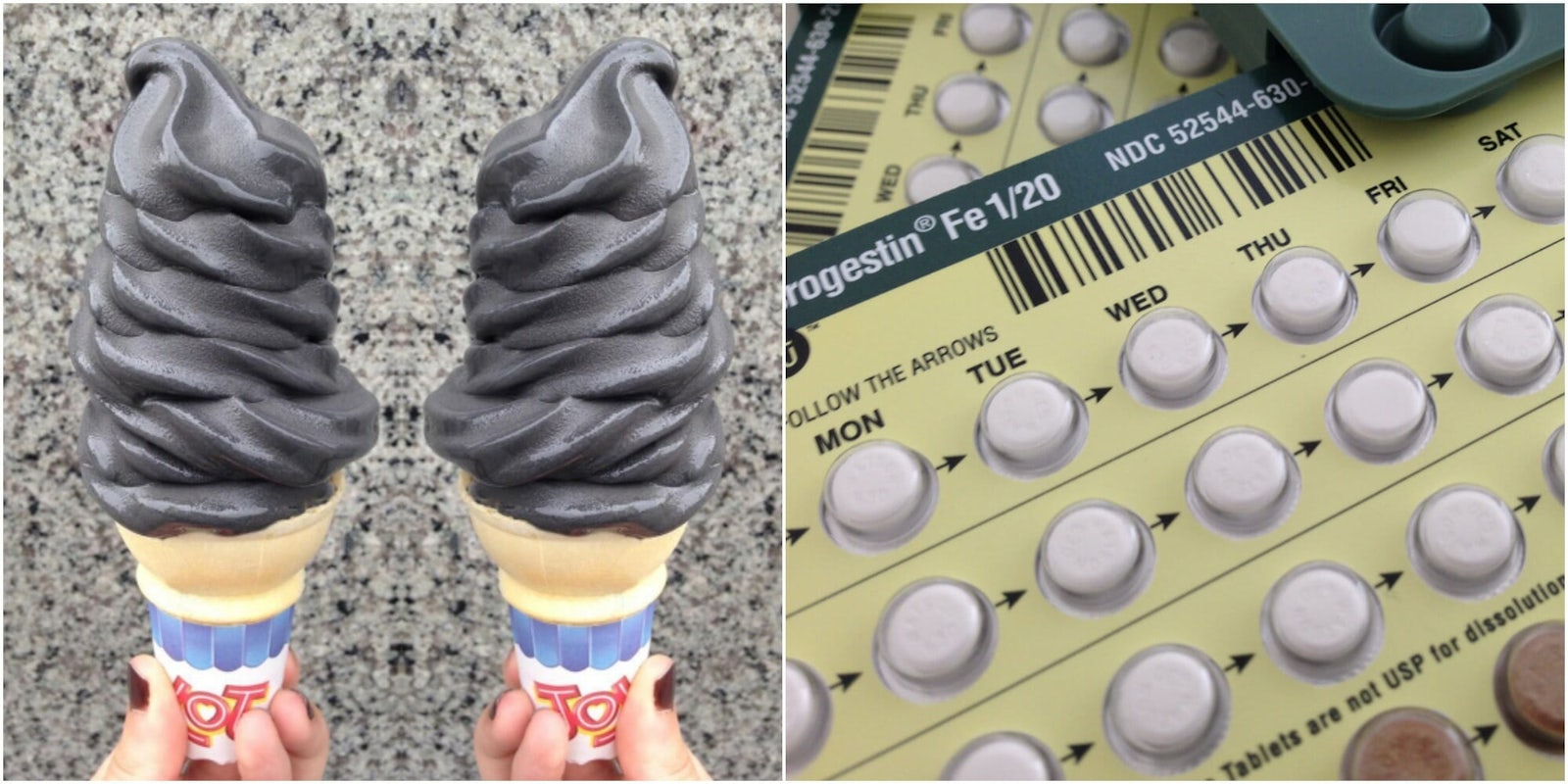Charcoal-infused ice cream was destined for social media fame from the moment of its inception. The black ice cream is not only striking in photographs, it grabbed headlines as “the goth alternative” to the unicorn food trend, making hip ice cream shops like LA’s Little Damage irresistible destinations for foodies, Instagram stars, and non-vegan Morrissey fans alike.
Charcoal ice cream is made with activated charcoal, a synthetic form of carbon that has been used for hundreds of years as a poisoning antidote, and is still prescribed in hospitals for certain drug overdoses because of its ability to bind substances in the gut and prevent them from entering the body. In our post-Goop world, activated charcoal has become a popular ingredient in “detoxing” regimens and health foods. This has added to charcoal ice cream’s allure, but it’s also raised some concerns about possible side effects. Specifically: the risk of activated charcoal interfering with prescription drugs, including oral contraceptives.
A petition calling for companies to put a warning label on their activated charcoal food products has garnered nearly 19,000 signatures. “It basically absorbs what’s in your stomach—including your prescription meds,” the petitioner writes. “I would totally nom on some of this black ice cream, but in the interest of informed consent, ice cream shops should let their customers know the risk.”
So, can eating activated charcoal ice cream actually mess with your birth control? The answer to that is a resounding, “Well, it depends.”
“A variety of factors such as our genetics, diet, medication use, stress-level, sex, etc., can influence how we respond to a given drug or chemical,” Brendan Stamper, associate professor at Pacific University’s School of Pharmacy, told the Daily Dot. “Activated charcoal is no different.”
Pharmacist Roger Hollingsworth told the Daily Dot, “As an absorbent in the intestinal system, you can imagine it can and does interact with medications. If it’s just one time, then it should be fine, but that being said, the bigger the dose, the more likely to have the negative absorption.”
While ice cream stores guard their recipes as closely as state secrets (or maybe closer, in the era of Trump’s Russian spy social mixers), the chances of a single serving of black ice cream containing enough activated charcoal to spark a drug interaction are slim. Prohibition Creamery in Austin, for example, uses less than 1.5 ounces of coconut charcoal per 1,000 ounces of ice cream, which isn’t enough to carry any risk. However, when considering this recipe for homemade charcoal ice cream, which calls for a whopping 1/4 cup of activated charcoal, Hollingsworth said, “I would recommend waiting at least 2 hours [before and after taking medication] to eat that ice cream.”
A 2001 study supported Hollingsworth’s timing advice, finding that women on oral contraceptives who ingested activated charcoal at least 3 hours after and 12 hours before taking their pill experienced no increased risk of ovulation. So while it’s probably fine to enjoy a charcoal ice cream cone while taking oral contraceptives, if you want an extra layer of reassurance, don’t pop a pill at the same time as your ice cream.
This goes for other medications too. While birth control failure is a growing concern in today’s hostile reproductive rights climate, ingesting a large amount of activated carbon (or ingesting it regularly) has the potential to interfere with other prescriptions. “Cardiac medications are affected as well,” says Hollingsworth. “Digoxin blood levels are decreased by activated charcoal. I could go on about different interactions like some psychiatric medications—Olanzapine doses can be reduced by up to 60 percent.”
Tamara Keefe, owner of Clementine’s Creamery in St. Louis, was well aware of the health implications of activated carbon when she started formulating her black cherry ash flavor. “I talked to my friends in the medical community about it, some nurses and doctors, and I even reached out to some veterinarians,” she told the Daily Dot. “I checked with them and they said it was super safe as long as people don’t mind the taste of it in the food.”
Based on charcoal ice cream’s rising popularity, people are loving the taste. And so far, we haven’t experienced a wave of unplanned pregnancies attributed to the trendy dessert. But while petitions calling for warning labels might be preying on fears that are slightly far-fetched, it still wouldn’t be a bad idea to make sure people have all the information before they indulge.
Because as Hollingsworth points out, when it comes to medication interactions, it’s always better to play it safe. “I would always suggest taking any form of charcoal as far away (time-wise) from any medications as possible. All this depends on the dose of the charcoal, but why risk it?”


